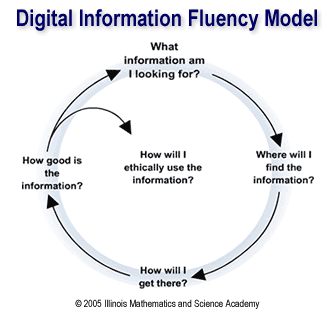Information Fluency and Physics Curriculum: Faculty/Librarian Collaboration
Articles
Abstract: Much has been written about the importance of information fluency. Information fluency is defined as the ability to locate, evaluate and use information effectively, efficiently and ethically. In this brief article, I will summarize some ways one might add information fluency to the physics curriculum.
They say one picture is worth a thousand words. Below is a graphic that gives one a sense of what information fluency is all about. The diagram is relevant to all information sources, not just digital materials.

No one likes busy work. The most effective way to integrate information fluency into a student’s life is to connect lesson plans to a specific subject assignment. Assignments can be as simple as asking students to evaluate a web page or as complex as a semester long seminar class with formal assignments. Lessons can start as early as middle school and go up to graduate level.
A sample of a web page evaluation sheet can be found on eCommons Cornell. (1) Brigham Young University has a formal class called "Writing in Physics" for their senior physics majors who must write a mini-thesis. (2) The physics department at the University of Buffalo asked librarian A. Ben Wagner to design a course for physics graduate students. The class description is included in the poster that I did for the "Graduate Education in Physics: Which Way Forward?" conference. (3)
Each state has established its own standards for information fluency. The web site, 21st Century Information Fluency Skills , written by the Illinois Mathematics and Science Academy, is an excellent source of definitions and examples of curriculum. (4)
To better understand the questions that physic s faculty have, I monitor several listservs: PHYSOC, OPHUN-L, PHYS-L, and PHYSHARE. One discussion thread was about the difficulties that physics students have dealing with physics word problems. I was able to share with faculty the logical problem solving strategy developed at the University of Minnesota. (5)
Like many institutions, Cornell offers professional development courses for teachers. I am included in the Research Experience for Teachers ( RET) and other workshops that are offered by Cornell for science teachers at all levels. I help teachers find and evaluate background information for their lesson plans. The RET participants write up lesson plans that are readily available to all. BUT, unless one knows where to look (6), the lesson plans are lost in cyberspace.
The Professional Concerns Committee for AAPT sponsored a number of cracker barrel discussions for various constituencies. Based on expressed needs, I am gathering web pages that would be useful in addressing the concerns. I have been using Connotea, a free service of the Nature Publishing Group, to facilitate communications among researchers. One can sort the contents of my Connotea page (7) by any of the "tags" or keywords listed on the left side of the screen. For example, I have been collecting materials about women in science, professional development opportunities for physics faculty, and lesson plans. Because physics classes do not typically have a writing component, I have collected some examples of alternative writing assignments on Connotea. A person who is preparing to write a term paper, give a poster session, or an oral presentation on a topic needs to find good information. Information fluency skills can save a lot of time. I have compiled a list of resources that would be helpful in the process of integrating information fluency skills into the physics curriculum. (8)
There are 245 members of the Physics, Astronomy and Mathematics (PAM) section of the Special Libraries Association (SLA). About 650 librarians world wide belong to the PAM listserv. In many cases, a science librarian must serve faculty and students in several different sciences. Our mission is to support the teaching and research activities of our faculty and students. Our activities include collection development, reference services and instruction. The Internet has changed the information landscape drastically. We librarians participate in initiatives like arXiv, the National Science Digital Library (NSDL), and digital books projects. For example, Cornell University has a collection of digitized mathematics books available on-line. (9) At the annual meeting of SLA in June 2008, Bruce Mason and I will be presenting to the physics round table. Our goal will be to recruit science librarians to reach out to regional groups of APS and AAPT to spread the word about comPADRE as well as other excellent on-line materials. Faculty and librarians share many of the same goals. By working together, I feel we can lighten the load and increase effectiveness.
Over the past seven years, I have presented on the topic of information fluency at many AAPT meetings. By working with the Forum on Education, I hope to share what I have learned with a wider audience.
References
1. Viele, Pat. Sample Web Page Evaluation Sheet
2. Brigham Young University PHYSCS 416A Writing in Physics
3. Viele, Pat. Information Fluency and Graduate Physics Education
4. 21st Century Information Fluency Skills
5. A Logical Problem Solving Strategy
6. Teacher Developed Lesson Plans
7. Pat Viele’s Connotea Collection
8. Information Fluency and Physics Graduate Students
9. Cornell University digital mathematics books
Pat Viele has been the physics and astronomy librarian at Cornell University since 1994. She is a member of APS and AAPT. Pat is serving as the chair of the Committee on Professional Concerns for AAPT this year and is a member of the Sub-committee on Classification and Information Retrieval for AIP Publishing. She can be reached at ptv1@cornell.edu
